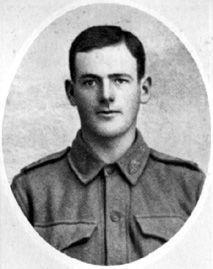
2nd Lieutenant Philip George WALE
Clicking on Photo will return to Page U,V,W,Y
WALE
2nd Lieutenant Philip George
7th Battalion, Australian Imperial Force (enlisted as Sergeant no. 1040,
B Company).
Born 26th Oct 1894, in Benalla, Victoria.
Educated: Benalla & Euroa State Schools, Victoria.
Single; Bank clerk (National Bank), of Binnie Street, Euroa, Victoria.
Next Of Kin: Father; George Edward Wale. Mother; Louisa Jane Wale (nee
Peart), of Binnie Street, Euroa, Victoria
Photos of Lieutenant Wale are known to exist in the following:
National Bank Memorial Volume p155.